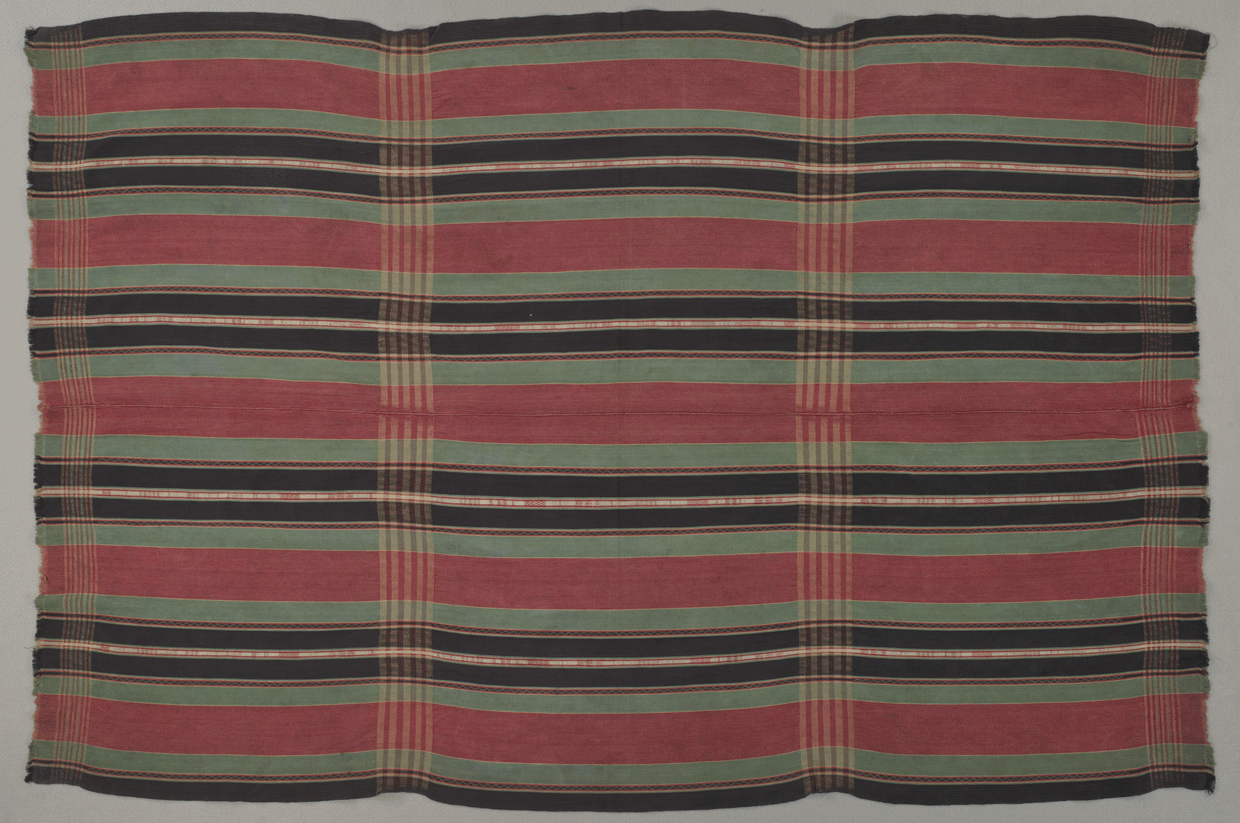 Art of the Zo, Philadelphia Museum of Art, Tiddim Woman’s Wedding Mantle (Tawnok), 1900–30, Myanmar (Burma), Chin State, Tiddim Township (Gift of David W. and Barbara G. Fraser, 2014-70-28)
Art of the Zo, Philadelphia Museum of Art, Tiddim Woman’s Wedding Mantle (Tawnok), 1900–30, Myanmar (Burma), Chin State, Tiddim Township (Gift of David W. and Barbara G. Fraser, 2014-70-28)
Art of the Zo: Textiles from Myanmar, India, and Bangladesh, Philadelphia Museum of Art
The Philadelphia Museum of Art presents an exhibition of woven textiles made by the Zo peoples of South Asia, including works that range from ceremonial tunics and wrap skirts to mantles, capes, blankets, and loincloths. Art of the Zo: Textiles from Myanmar, India, and Bangladesh features traditional weavings worn for daily life and ceremonial occasions, such as weddings, funerals, and feasts. The exhibition comprises works from the Museum’s collection of costume and textiles, supplemented by gifts and loans from David W. and Barbara G. Fraser, coauthors of Mantles of Merit: Chin Textiles from Myanmar, India, and Bangladesh (2005).
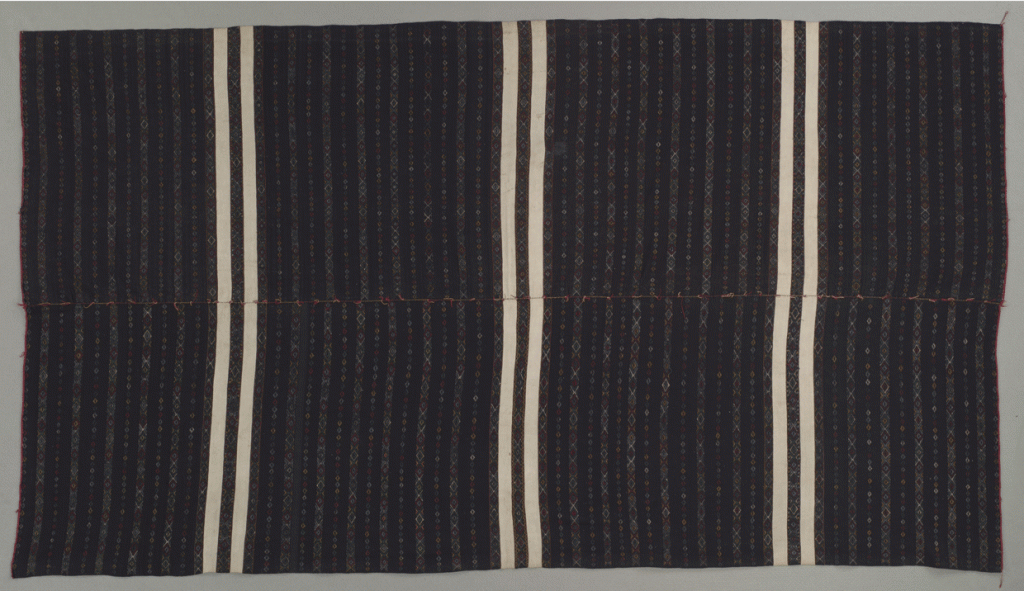 Art of the Zo, Philadelphia Museum of Art, Haka High-Ranking Man’s Mantle (Can-lo Puan), 1900–40, Myanmar (Burma), Chin State (Purchased with funds from the proceeds of the sale of deaccessioned works of art, 2006-57-1)
Art of the Zo, Philadelphia Museum of Art, Haka High-Ranking Man’s Mantle (Can-lo Puan), 1900–40, Myanmar (Burma), Chin State (Purchased with funds from the proceeds of the sale of deaccessioned works of art, 2006-57-1)
The exhibition showcases the patterns, techniques, and local variations that contribute to the beauty and craftsmanship of these woven treasures. Zo weavers create textiles that vary from unpatterned, indigo-dyed cloth and simple, colorful stripes to complex weaves that could be mistaken for embroidery. Among the highlights is a cotton blanket produced in a warp-faced weave around 1900 that would have been used in ceremonies for the sacrifice of a mithan, a semi-domesticated, ox-like animal. Also included is a Dai woman’s gray and white wedding blanket, woven between 1920 and 1960, which would have been created for a bride by her mother, along with shoulder cloths, decorated with glass beads and metal bells, which could double as baby carriers. A variety of men’s loincloths are on display as well, woven of cotton and silk.
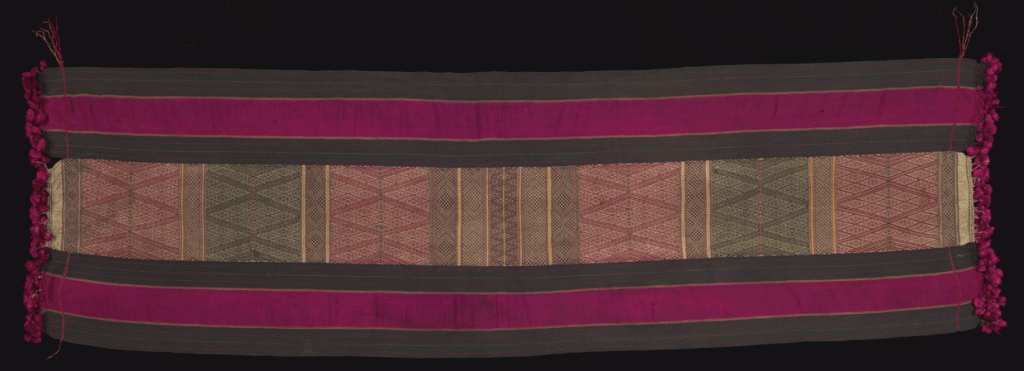 Art of the Zo, Philadelphia Museum of Art, Lauktu Woman’s Head Wrapper (Tonpauk La), 1910–20, Myanmar (Burma), Rakhine State (Purchased with the Stella Kramrisch Fund, 2006-1-23)
Art of the Zo, Philadelphia Museum of Art, Lauktu Woman’s Head Wrapper (Tonpauk La), 1910–20, Myanmar (Burma), Rakhine State (Purchased with the Stella Kramrisch Fund, 2006-1-23)
In addition to textiles, various adornments are featured in the exhibition, among them earrings, bracelets, and necklaces made of metals, glass, and mirrors. The exhibition includes an example of the back-tension looms made of bamboo rods and wooden sticks that are traditionally employed by the Zo peoples to produce their fabrics. The simple loom is shown with a partially woven cloth next to a finished example from the Museum’s collection to offer insight into the weaving techniques. A video presentation, photographic details of selected works, and graphics of specific weave structures further demonstrate the virtuosity of Zo skills.
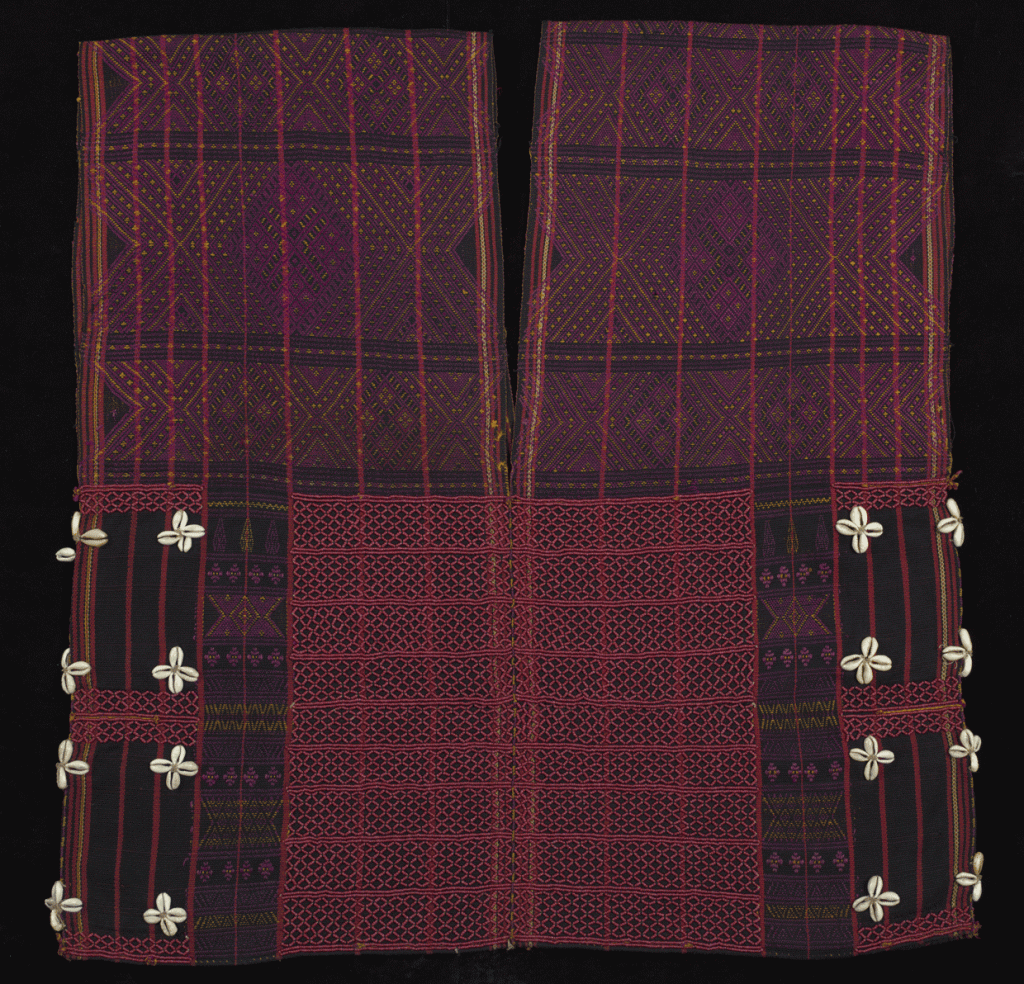 Art of the Zo, Philadelphia Museum of Art, Laytu Man’s Tunic (Khrangimm), 1920–40, Myanmar (Burma), Chin or Rakhine State (Purchased with the Stella Kramrisch Fund, 2006-1-18)
Art of the Zo, Philadelphia Museum of Art, Laytu Man’s Tunic (Khrangimm), 1920–40, Myanmar (Burma), Chin or Rakhine State (Purchased with the Stella Kramrisch Fund, 2006-1-18)
The Zo peoples, of Tibetan-Burmese origins, have lived for hundreds of years in mountainous regions of South Asia. They comprise about fifty linguistic groups, culturally related through affinities of language, the values surrounding their textiles, and the structure and technique of their weavings. Prior to the arrival of missionaries in the mid-1800s, they worshiped ancestral spirits and spirits dwelling in nature. Today most are Christian. Encouraged by missionaries to give up their traditional textiles, today Zo weavers continue to produce these culturally important textiles and frequently sell them as collectibles.
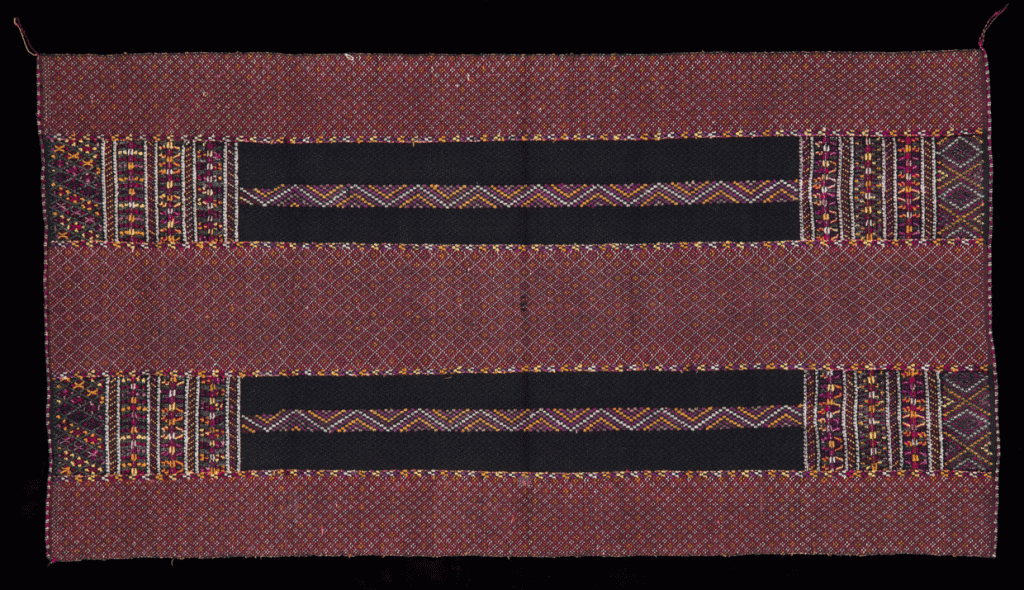 Art of the Zo, Philadelphia Museum of Art, Khami Woman’s Breast Cloth (Akhen), 1920–50, Myanmar (Burma), Rakhine State (Purchased with the Stella Kramrisch Fund, 2006-1-6)
Art of the Zo, Philadelphia Museum of Art, Khami Woman’s Breast Cloth (Akhen), 1920–50, Myanmar (Burma), Rakhine State (Purchased with the Stella Kramrisch Fund, 2006-1-6)
In Zo communities, textiles have long conferred status on the weaver and document the wearer’s merit in this life and in the afterlife. The textiles are woven exclusively by women and are prized as the highest form of art. The exhibition explores how these works are made and worn, and features early to mid twentieth-century examples from specific localities and cultural divisions, such as the Northern Chin; Southern Chin; Ashö; and Khumi, Khami, and Mro. Although today most Zo people increasingly adopt Burmese and western attire, the weaving traditions are being preserved through the efforts of textile experts like Pa Mang, Nu Shwe, and Mai Ni Ni Aung, who have engaged master weavers to produce contemporary pieces for sale and to train the next generation of weavers. Some of these are available in the Museum Store.
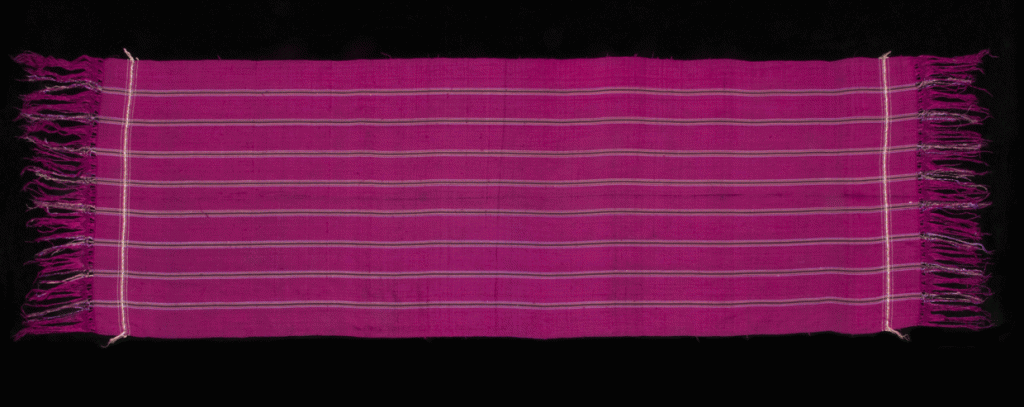 Art of the Zo, Philadelphia Museum of Art, Utbu Woman’s Mantle (Pachang Sungkyar), 1930–80, Myanmar (Burma), Magwe Division, Sedouttaya Township (Gift of David W. and Barbara G. Fraser, 2014-70-23)
Art of the Zo, Philadelphia Museum of Art, Utbu Woman’s Mantle (Pachang Sungkyar), 1930–80, Myanmar (Burma), Magwe Division, Sedouttaya Township (Gift of David W. and Barbara G. Fraser, 2014-70-23)
David Fraser stated: “These extraordinary textiles offer us rare and exceptional beauty. As records of the artistic traditions that illuminate Zo values, they also are highly valuable in preserving a living culture. Among the Zo, men create the looms, and they also make utilitarian baskets. The women create the art and they are much respected for it.”
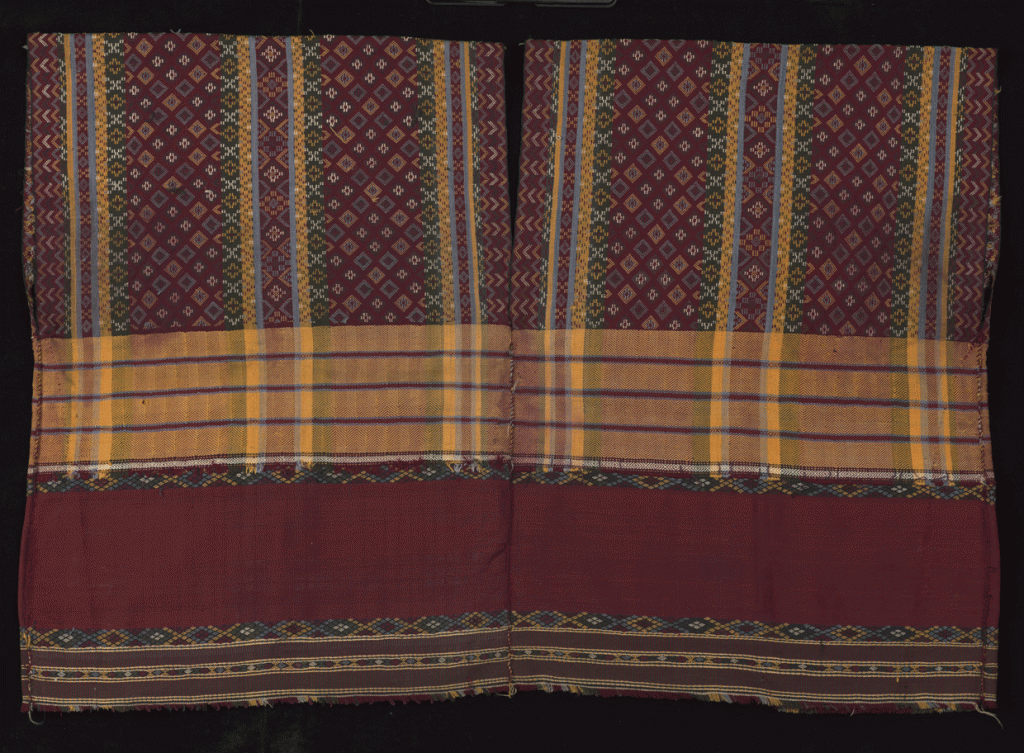 Art of the Zo, Philadelphia Museum of Art, Haka Woman’s Ceremonial Tunic (Kor), 1940–70, Myanmar (Burma), Chin State (Purchased with funds from the proceeds of the sale of deaccessioned works of art, 2006-57-5)
Art of the Zo, Philadelphia Museum of Art, Haka Woman’s Ceremonial Tunic (Kor), 1940–70, Myanmar (Burma), Chin State (Purchased with funds from the proceeds of the sale of deaccessioned works of art, 2006-57-5)
Support
Support for this exhibition is provided by The Coby Foundation, Ltd.
Curators
Dilys E. Blum, The Jack M. and Annette Y. Friedland Senior Curator of Costume and Textiles, with consulting curators David and Barbara Fraser
Location
Joan Spain Gallery, Perelman Building, ground floor, The Philadelphia Museum of Art
About David and Barbara Fraser
David W. and Barbara G. Fraser have been studying the artistry, structure, and cultural importance of Zo textiles for fifteen years. Their book, Mantles of Merit: Chin Textiles from Myanmar, India, and Bangladesh, won the Millia Davenport Publication Award of the Costume Society of America and the R.L. Shep Book Award of the Textile Society of America. Their work also garnered the Ancient & Modern Prize. They have curated exhibitions of Zo textiles at the Textile Museum in Washington, D.C., the University of Pennsylvania’s Arthur Ross Gallery, and Denison University, and David Fraser has co-curated an exhibition at Haverford College. Barbara Fraser is a member of the Advisory Council of the Textile Museum. A retired financial services attorney, she is a graduate of Bryn Mawr College and Emory University Law School. David Fraser is a member of the Costume and Textiles Advisory Committee of the Philadelphia Museum of Art. He is a research associate at the Textile Museum, a consulting scholar at the University of Pennsylvania Museum of Archaeology and Anthropology, and a master artisan of the Pennsylvania Guild of Craftsmen. A former president of Swarthmore College, he is a graduate of Haverford College and Harvard Medical School.
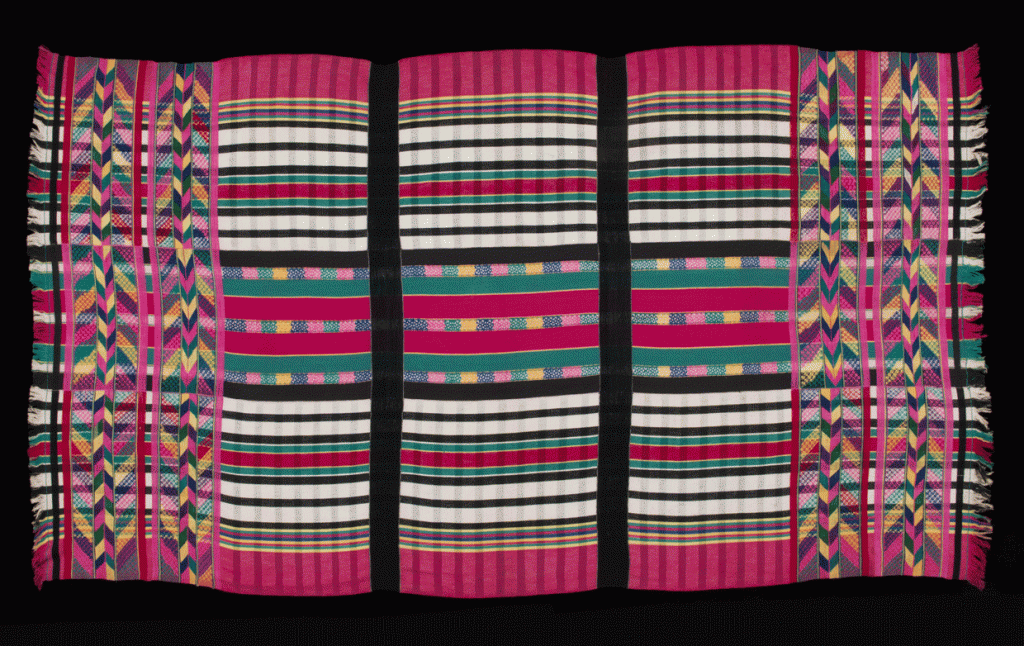 Art of the Zo, Philadelphia Museum of Art, Mizo Woman’s Ceremonial Wrapped Skirt (Puan Laisen), 1950–70, Myanmar (Burma), Northern Chin State or India, Mizoram (Gift of David W. and Barbara G. Fraser, 2014-70-25)
Art of the Zo, Philadelphia Museum of Art, Mizo Woman’s Ceremonial Wrapped Skirt (Puan Laisen), 1950–70, Myanmar (Burma), Northern Chin State or India, Mizoram (Gift of David W. and Barbara G. Fraser, 2014-70-25)
Exhibition hours
Tuesday–Sunday: 10:00 a.m.–5:00 p.m.
Social Media
Facebook and Twitter: philamuseum ; Tumblr: philamuseum ; YouTube: PhilaArtMuseum ; Instagram: @philamuseum
The Philadelphia Museum of Art is Philadelphia’s art museum. We are a landmark building. A world-renowned collection. A place that welcomes everyone. We bring the arts to life, inspiring visitors—through scholarly study and creative play—to discover the spirit of imagination that lies in everyone. We connect people with the arts in rich and varied ways, making the experience of the Museum surprising, lively, and always memorable. We are committed to inviting visitors to see the world—and themselves—anew through the beauty and expressive power of the arts.
Thank you to The Philadelphia Museum of Art for the content of this post.
Like The Philadelphia Museum of Art on facebook
Like DoNArTNeWs Philadelphia Art News Blog on facebook
Follow the new DoNArTNeWs.com
Follow DoN on Twitter @DoNNieBeat58
DoNArTNeWs on Tumblr
@donniebeat on Instagram
Affiliate Marketing [disclosure page] Shop on-line and help support DoNArTNeWs
Donate via safe and secure PayPal in the sidebar.
